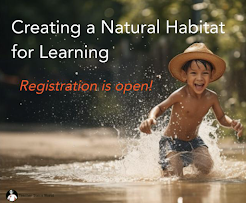Subscribe to:
Post Comments (Atom)
skip to main |
skip to sidebar

Teaching and learning from preschoolers
Teacher Tom's Course
Search Teacher Tom
Book Teacher Tom for your event
If you are interested in inviting me to speak at your conference or to otherwise work with me, please send your query to my wife and business partner:
Jennifer@TeacherTomsWorld.com.
We will make every effort to accommodate your schedule, but please keep in mind that I'm often scheduled a year or more in advance so please book early!
Stay Up To Date With Teacher Tom
To keep up to date with the latest news from Teacher Tom, sign up for our email list. We will not sell or share your information, ever. And we won't flood your inbox. To get on the list, please email Teachertomhobson@TeacherTomsWorld.com with "Email list" in the subject line. Thanks!
support teacher tom
This is my personal blog and is not a publication of the Woodland Park Cooperative Preschools. I put a lot of time and effort into it. If you'd like to support me please consider a small contribution to the cause. Thank you!
Teacher Tom's Topics
- art (487)
- blogging (65)
- circle time (166)
- community (1151)
- conflict (393)
- construction/tinkering (572)
- cooperative (211)
- cooperative nuts and bolts (5)
- death (25)
- development (369)
- dramatic play (557)
- education reform (410)
- education transformation (425)
- emotions (499)
- fairness (270)
- fine motor (211)
- gardening (41)
- Halloween (24)
- kindergarten (75)
- Language (81)
- large motor (485)
- life and death (296)
- Little World (19)
- love (282)
- media (60)
- Mister Rogers (85)
- multi-aged classroom (69)
- outdoor play (771)
- parenting (622)
- play summit (70)
- podcast (6)
- power (234)
- rules (164)
- science (652)
- sensory (267)
- songs (53)
- stories/storytelling (233)
- superheroes/princesses (114)
- tape-off (9)
- Teacher Tom's art (24)
- Teacher Tom's First Book (5)
- Teacher Tom's Second Book (3)
- teaching (1468)
- traditions/rituals (243)
- Why I Teach The Way I Do (11)
- Woodland Park (135)
About Teacher Tom
- Teacher Tom
- Seattle, Washington, United States
- I am a preschool teacher, blogger, speaker, artist and the author of Teacher Tom's First Book. After nearly 20 years as the preschool teacher at the Woodland Park Cooperative School teaching children from 2-5, I'm now working with businesses and other institutions to help make high-quality, play-based preschool education a possibility for children everywhere.
Subscribe to Teacher Tom by email
Teacher Tom's Blog List
-
-
PA: Far Right Law Group Comes To Meadville20 hours ago
-
-
-
-
Solstice 2023: Abandon4 months ago
-
Studio and Umbrella Project Update6 months ago
-
Miso Marinated Air Fryer Chicken Kebobs8 months ago
-
An Epilogue of Sorts1 year ago
-
P is for Pizza!2 years ago
-
-
-
-
-
Labor of Love6 years ago
-
Let the Babies Play7 years ago
-
Janet Lansbury
Blog Archive
-
▼
2020
(260)
-
▼
December
(22)
- An Education That Emerges From Those Things That M...
- They Say There are No Stupid Questions. I Beg to D...
- I Know the Secret to Making Your Dreams Come True
- Life Itself
- This Cursed and Blessed Year
- Teacher Tom's Last Minute Gift Ideas
- When the Sun Stands Still
- The Technology of Speaking With Children So They C...
- A Profession in Crisis
- Projection, Empathy, Compassion
- How We Become Wiser, Gentler People
- What if Being Good at Things Wasn't the Point of D...
- I See It Every Day in Preschool
- Worrying About Using the Words of Diagnosis
- Sucking the Joy From Their Lives
- Getting on the Same Bandwagon
- It's the Thinking
- Learning Rules Vs. Intellectual Development and Un...
- False Beliefs
- The Complete Education
- This is What Real Learning Looks Like
- "Now Eat Your Food"
-
▼
December
(22)
Copyright © 2000-2023 Thomas Hobson






No comments:
Post a Comment